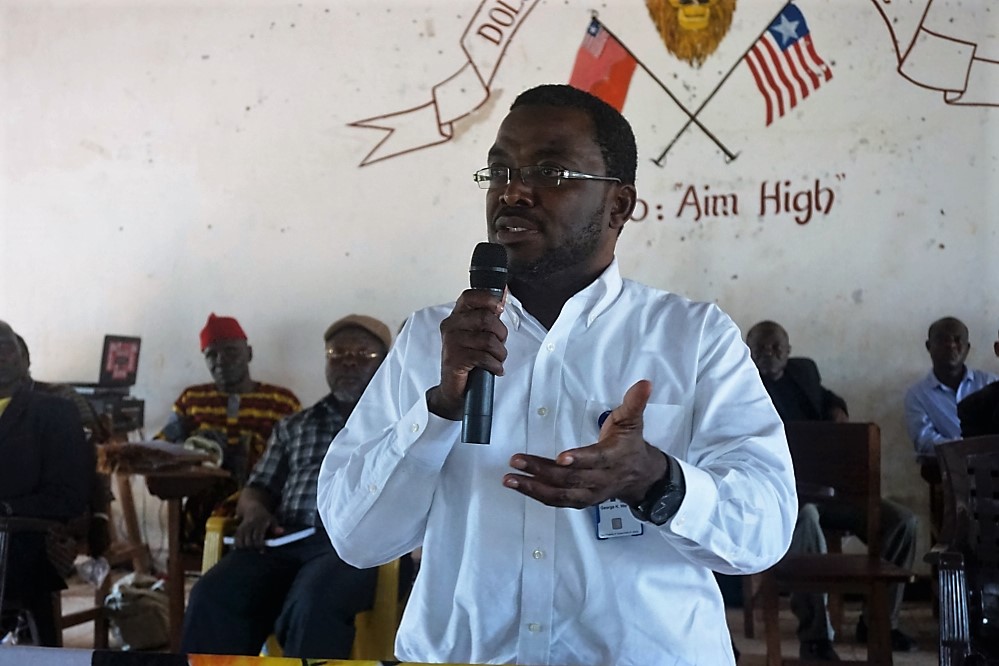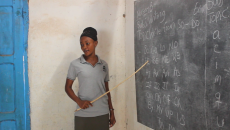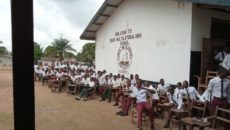MONROVIA, Montserrado – Education Minister George Werner’s latest move to partner with private institutions to improve the quality of Liberia’s education system has been met with intense resistance from many individuals and groups. In an exclusive interview with The Bush Chicken, the Minister clarified some of the misconceptions about his approach.
Werner said the move towards a public-private partnership, as opposed to privatization – as it has been characterized in the media – was driven by the realization that after many different attempts at improving the education system have simply not worked.
“Despite our best efforts, training teachers, building new schools, renovating schools, we still have a challenge,†he said. “We cannot explain the investment that has been made, in terms of quality in the classroom and the learning outcomes. And if we went by the status quo to continue doing what we have been doing, it will take decades for Liberia to catch up.â€
For the first year of the pilot phase, Werner said private organizations would operate 70 schools. Bridge International Academies, the multinational American-based company that operates schools across East Africa, will operate 50 schools. The remaining 20 schools may be split among smaller organizations.
While Werner expressed his preference for Bridge, donors, and other government partners wanted competition between school operators. He ultimately believes the private sector will be the key to improving education.
“There are things that the private sector does very well – management systems, accountable systems – we should leverage this to improve learning outcomes in an accelerated way,†he added.
Not everyone agrees with Werner. The United Nations Special Rapporteur on the right to education, Kishore Singh is among the noticeable critics of the plan, arguing that involving players from the private sector who have no obligations to the people may violate rights that every child has to education.
Singh said it was “ironic that Liberia does not have resources to meet its core obligations to provide a free primary education to every child, but it can find huge sums of money to subcontract a private company to do so on its behalf.â€
Among prominent international actors in opposition to Werner’s plan is a pan-African trade union called International Trade Union Confederation-Africa. In a letter to President Ellen Johnson Sirleaf, General Secretary Kwasi Adu-Amankwah argues that Werner’s plan would threaten Liberia’s ability to ensure inclusive and equitable education. In appealing to the president, Adu-Amankwah mentioned similar calls from Education International, a global federation of teachers’ unions.
Werner suggests that such arguments made by union organizations were not genuine.
“Before this initiative was launched, Education International sent a team here to educate their counterparts on how to oppose it,†he said. “They don’t see eye-to-eye with Bridge International Academies. You know why? In Bridge schools, there are no teachers’ unions. No teachers’ unions in Bridge Schools in East Africa.â€
Under the new labor law, however, such restrictions against teachers joining unions would be illegal.
Still, the main teachers union in Liberia, the National Teachers Association of Liberia, continues to oppose Werner on this and many of his proposals, including another to test all teachers.
Werner acknowledged that “teachers’ unions exist to improve their own welfare, and that’s good.†However, he said he needed to take certain measures to improve the quality of education. And testing the teachers to determine “training needs,†cleaning ghost names off the payroll, and piloting this new private-public partnership would help accomplish that.
“My vision of teaching in Liberia is that it becomes licensed – that you hold teachers accountable for the profession they have, and to be proud of themselves in delivering and forming the minds and hearts of future leaders of this country,†the Education Minister said.
But he said the pushback was mainly because of the entrenched interests who fear losing control over a corrupt system. “And so if you feel that for a long time you’ve enjoyed this sense of government not holding you accountable and now there’s a system being put in place to hold you accountable, you have every reason to fight that system.â€
In an interview with Voice of America, Samuel Johnson, the secretary general of Liberia’s teacher’s union, said the union would fight Werner’s proposal because it was not only infeasible given the limited internet and electricity infrastructure in the country, but also that it was illegal.
Even if the program was feasible, some say the Ministry of Education could use the money associated with the program to improve other aspects of the education system in the country, instead of concentrating the available funds on relatively few schools.
Werner explained that most of the funds being spent on the program would come from donors – which the government would not actually be spending any more than what it already spends on teacher salaries and maintenance of school facilities. He then provided a somewhat clumsy addendum, essentially saying that all other programs to improve schools were already funded. His response underscored his strong belief in this public-private partnership.
After recounting all the existing traditional programs in place to improve public education, he said, “There is no way the public sector can do it alone. Government cannot do it alone. You must leverage the best technology available.â€
Asked about what authority he had to make a unilateral decision to partner with an organization like Bridge International Academies, Werner explained that his partnership was no different than other partnerships the Ministry had made with other organizations such as UNICEF.
Werner said he needed to raise US$10 million for the project. His awkward discussion of financials seemed rooted in the fact that two of the Ministry of Education’s biggest partners (USAID and the European Union) were not explicitly supporting his new initiative. It was clear that the limited amount of funds under his control was also frustrating.
“The national budget for the Ministry of education, not for the educational sector, is currently around US$42 million. Of that US$42 million, between US$35-38 million is just salaries,†Werner explained. “You see what I’m talking about? It’s just salaries. So you don’t have any money left to train your teachers and do all the things you want to do – school infrastructure – there’s nothing left. So much of the sector still relies on donors.â€
He said even though USAID and the European Union were not yet supporting his initiative, he hoped they would keep an open mind about the results of the pilot. “At the moment, we have a very intense conversation with the donors because we want to see their interventions more clearly aligned with the ministry’s priorities. And so there’s that back and forth. And the conversation is positive – I hope – it’s going the right direction.â€
Werner also acknowledged that sustainability was an issue, but a minor one. He made it clear that the main focus should be on the quality of education.
“If the model works, and parents want it, and communities want it, government will need to find a way to fund it,†he said, before providing possible ways to fund the program in the future. “There are various suggestions on the table. You can do it through taxes. I suggest, as others have, tax alcohol, tax tobacco, and tax gambling, and create an education trust fund out of that. That’s one way.â€
He continued, “The other way if you continue with the status quo, is to incrementally give three percent of the national budget to education over, say five years. You could fund this.â€
A major reason why Werner’s initiatives often encounter hurdles and attract negative public reaction is the often poor distribution of information and communication by the Ministry. For example, Werner did a poor job of explaining his decision to close schools after the end of the Ebola epidemic, a move that prompted the legislature to initially reject Werner’s plan. The Ministry eventually ended up closing schools a month later than originally proposed. The Minister acknowledges that sometimes he does not “speak like a politician,†which has led to frictions with the legislature and general public opinion. He has actually hired a legislative liaison to help him improve his relationship with the legislature.
But he says his tendency to attract attention stems from his yearning for change: “I’ve never been happy with the status quo. I am an institutional rebel, and I have a cause. My goal, as long as I’m here, is that the child somewhere, wherever – upcountry, in the village – has as much access to quality education as does a child in Monrovia. And that requires a lot of thinking, a lot of courage, to be able to challenge what Monrovians believe is rightly theirs. To bring it to the countryside, so to speak, and let others enjoy it as they do.â€



